#fate koha ace
Explore tagged Tumblr posts
Text

Pull-Back Car - Drive Nobu by Aniplex
#aniplex#anime figure#figure collecting#fate#fate series#fate grand order#fgo#fate go#trading figure#oda nobunaga#fate koha ace
136 notes
·
View notes
Text
I find it so funny that Fate/Koha-Ace was just made for jokes and stuff then a few years later it gets a remake with a very serious plotline (along with the non-chibi artstyle) with lots of gore and violence. We stan both koha ace and redline ‼️
25 notes
·
View notes
Text

#oda nobunaga#oda kippoushi#織田吉法師#nobu#fgo#fate grand order#fate type redline#fate koha ace#fate#my art#fanart
25 notes
·
View notes
Text
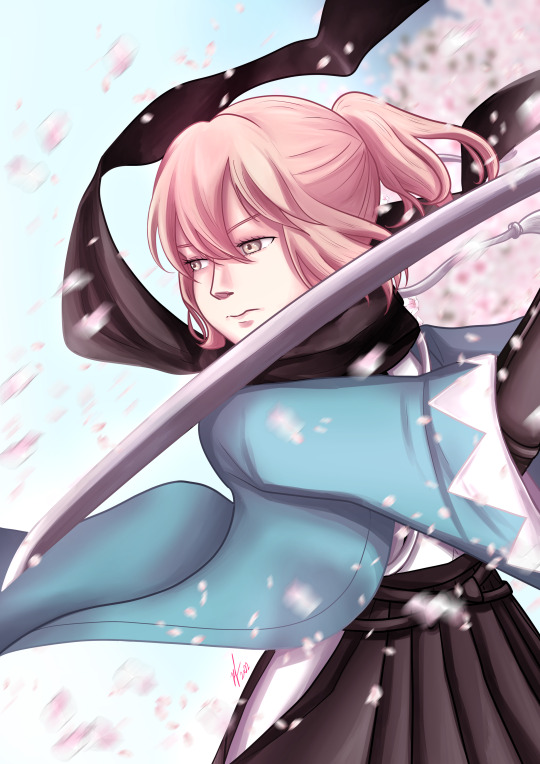
Shinsengumi's First Unit Captain, Okita Souji (2022)
10 notes
·
View notes
Text
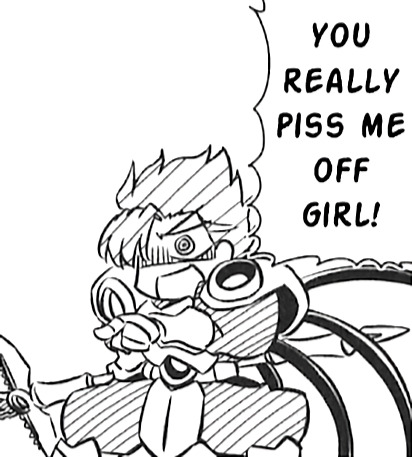
Send this to a girl that really pisses you off
6 notes
·
View notes
Text

Okitoes
336 notes
·
View notes
Text

Local manslayer found dead of tuberculosis in Kyoto, 1868
113 notes
·
View notes
Text
Recent chapters of the underrated Fate spinoff Fate/type Redline got me in my feelings so I had to talk about it at lengths, even moreso now that it hasn't updated in months (the mangaka, Ryouji Hirano, has health problems I believe). Spoilers obviously.
Now, when I call type Redline, "underrated", it's more of a subjective than objective assessment. Despite being a manga and thus far more accessible than the untranslated visual novels or light novel series of TYPE-MOON, I see it discussed fairly rarely. At the very least, as far as I know, there hasn't been much big posts analyzing it, so I believe this should be one of the first.
Just don't expect something really deep, these are mostly my musing, rambling observations.
In fact, for a long time, I didn't really have a well-articulated thought about Redline's themes. The contrast of a Holy Grail War taking place in the middle of a world war simply had me chalk it up to the tried and true "war is hell" and not think any deeper (which was a bit intellectually lazy of me). And there is certainly that, but it's a bit more elaborate than that, or else I wouldn't find Redline as interesting. And it all reached a thematic "climax" of sorts in the recent chapter as of the time of writingé
In reality, the story signaled its central theme from the very start, I just wasn't paying attention. One of the first chapters ends with this page:

At first, I thought this was just about Nobunaga. But it turns out this specific page and its text will become the precursor of how the manga is going to present Servants, and how this presentation fits into its larger representation of what war is.
Something you hear somewhat frequently when people mention Redline is "it made Servants scary again". It is only half true, Servants have usually only been "scary" in specific circumstances (Bluebeard in FZ, True Assassin in FSN, and Jackie in Apo come to mind). What they actually mean is that Redline shows Servants as above human again, and it does so by showing them brutally go through lots and lots of human bodies, when Fate is usually about Servants fighting each other. You see Servants vs. humans sometimes, but it's usually 1v1 deals. The only notable exception I can think of is Clan Calatin against Alcides in strange Fake.
There is also Apocrypha, but they are up against armies of homunculi, golems, and animated skeletons, so the dynamic is a bit different than with modern armies. It does however say this.
Indeed, Lancer of Red could burn to ash and crush the stakes with his flames and divine spear. But the Red camp's odds of successfully opposing the Black camp's overwhelming amount of material resources were fifty-fifty. Fighting a force of twenty thousand was beyond the capacities of even a mighty Heroic Spirit. Even then, there would have been no problems if they were alive, but right now they were Servants. The more they consumed prana in great quantities, the closer they approached death. (Apocrypha volume 2 ch.2)
Which is interesting in light of Redline's story, but I digress.
But here, in Redline, because it's during the Second World War, and members of the military are using Servants to do their bidding as well as planning to use them to win the war, there are a lot of interactions between Servants and modern human armies, usually violent ones, to catastrophic results, as Servants go through lots of human meat like cheese. The picture above is after Oda Nobunaga shoots down an entire fleet of American planes heading to Japan.
It's a type of interactions we only ever really saw when Berserker Lancelot in Zero overtook a JSDF fighter jet to fight Gilgamesh on Vimana, while the other plane got eaten by the Lovecraftian horror Caster summoned. The militarized forces of Faldeus in FsF mostly only go after human mages and steer clear of Servants.
And that makes for an interesting contrast that Redline is all too happy to highlight time and time again. When they say "Servants are scary", they mean "Servants are above human", in every sense of terms. No normal human can harm them or even pose a challenge to them, for they are above human strength and capabilities: they are superhuman, they are inhuman.
And that does not just mean inhuman power, but also inhuman thinking.
One of the main conflict throughline of the manga is the relationship between Kanata Akagi, our main protagonist, and his Servant Okita. They don't clash as such, it's not like Fate route Shirou hindering Saber from doing her job, nor is it like Kiritsugu disregarding Saber. It's more low-key, like a misunderstanding that can never be solved. Okita was a warrior in life, and this Holy Grail War in war-torn Japan is just another battlefield to her. Kanata however was born and raised in a Japan long after the war ended, in more peaceful times where he never had to kill. And it's this fundamental difference in lived experiences and mindset that stops them from ever reaching an understanding about how to approach the war:



Even later, as the war goes on, after Okita almost killed potential allies (more on that later), and Kanata reveals to her he comes from the future and what his goals are (ensure his grandma doesn't die and he can come back), and they decide to have a more honest partnership with each other, it's still not enough.
Because when Okita kills a human soldier again, this time a soldier wounded by Berserker who charged Kanata because he was a Master and he blamed magi for how pear-shaped the whole situation has become, this time she does a 180 and instead of convincing Kanata to become ready to kill, she instead wants him to think of her as his tool to kill in his place and take the burden upon herself:




Kanata can only ask her if she's really fine being a sword to be used by someone else and nothing more, to which she replies that's all she needs.
Do note how completely obscured, borderline blank (save for a small, thin-lipped smile), Okita's face is as she says this. As if Kanata and us readers really can't tell how she actually feels about her own words.
This is not the first time the manga does this with Okita.
Coming back to the almost aborted alliance I mentioned earlier, what happened is that, a few chapter before this, the Rider of this war, Sakamoto Ryouma and Oryou, met with Okita to ask her and her Master for an alliance to stop the war from spiraling further and kill more innocents. It would be normal to be suspicious of their intentions, especially since Ryouma initially hides from her that he is a Servant.
But that's not the reasoning Okita uses to reject the alliance and subsequently attack them:

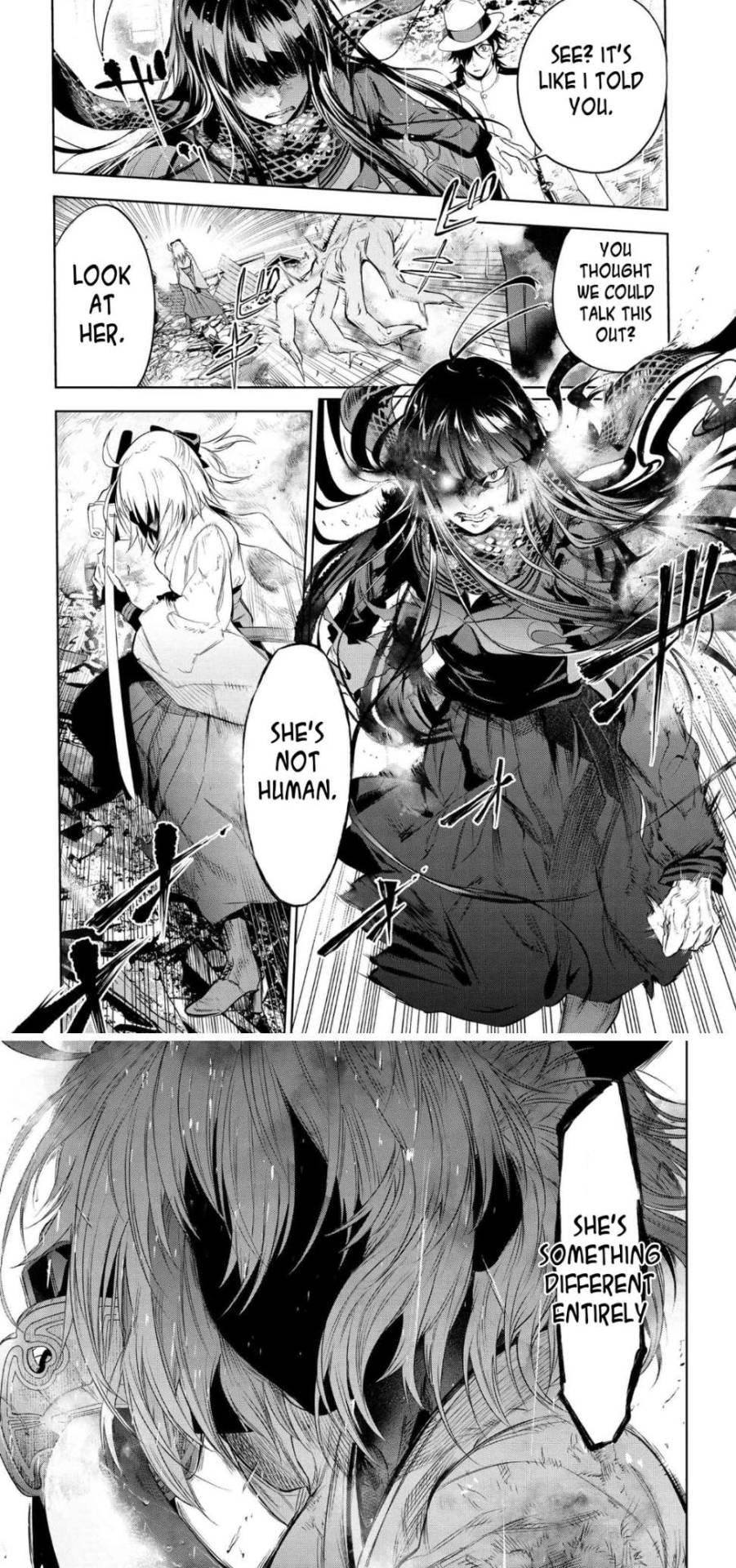
"There is only one path for me (war)." And here it is again: "She's not human."
And it happened even earlier too. When Servant Assassin (Okada Izou) fights Okita, he grows more and more disturbed as he doesn't feel fear, anger, or exaltation as he fights and cuts her, feeling nothing at all from her aside from the scent of blood. Okada's thoughts are interspersed with Kanata's own thoughts about visiting his dying comatose grandmother in the hospital as a kid. And when Kanata touched his grandmother's hand, just like when Okada faces Okita, all it felt like was that:

As you can see, a lot of emphasis, both textually and visually, that Okita does not feel human, and her way of thinking is so alien people can't comprehend her.
And it's not just her, Servants in general are portrayed this way throughout. You saw the pilot's words about Nobunaga at the start of this post, but it occurs later as well. When she was first summoned in the previous war a few years ago by the Imperial Army, her summoner was an arrogant dude who tried to get her to submit and she casually beheaded him. Following that is this page:

Nothing showing on this blood soaked face except for elongated eyes like those of a monster. And after that, everyone in the room prostrate themselves before her like she is a god they worship.
She picks her Master from the crowd, the half-Japanese girl Kaname Asama, and she treats her surprisingly decently from what we see throughout the manga, giving the shrinking violet of a girl respect like she is her attendant, unlike Kaname's boss Magatsu (more on him later) who threatens her and even hits her.
So you would think they have a cordial relationship? Well, maybe they did, but that was until the recent chapter, which has Magatsu's Berserker fight Lancer, and instead of helping their ally, Nobunaga wants to leave, which leads to this exchange:


The same face and eyes again. Kaname doesn't understand her Servant, nor can she tell what she's thinking, just as Nobunaga's face loses all expression, making it impossible for us to tell as well.
(This is not exactly new in regard to Nobu: Keikenchi, the original author of Koha-Ace and the mind behind Redline, already made a Koha-Ace oneshot previously focusing on her, and in it it was shown that, when she was alive, Nobunaga could not "hear" the voices of other people, other humans, and it's her being unable to understand other people that contributed to both her rise and fall)
Another Servant serving as a good example of this is Berserker, which obviously makes sense when it's the Class that from the very start of the Fate franchise in Fate/stay night was there to be impossible to communicate with. But interestingly, everything that surrounds Berserker, not just the Servant itself, reinforces this theme, as if the story employs irony in making the maddest of them all in a war full of mad people the more in-depth examination of the idea instead of being the most obvious.
But I need to scale back a bit to explain.
The Master of Berserker is Major Magatsu, the head of the Imperial Army's magecraft division and one of the main human antagonist. He is kind of interesting in how it's not just his Servant, but his own actions that act as a fulcrum to demonstrate the point. See, in these last stages where it is clear Japan is going to lose, Magatsu wants to keep the war going. His main goal is that he sees the war as not just for the glory of Japan, but as an opportunity to create a world where mages stand at the top, even planning to orchestrate a secret coup within the Japanese military. He is able to amass a great number of men under him, all fanatically loyal to him due to a mixture of his own charisma and appeal to nationalism as well as cigarettes laced with suggestive tobacco making the soldiers smoking it pliable. His followers are so loyal in fact, that when a team of them comes back defeated after facing a Servant trying to deal with Team Kanata, they beat the only survivor up and torture him for his failure and for failing Magatsu, without Magatsu's knowledge or consent (in fact, he is slightly disturbed by this and thinks to reduce the dosage of the tobacco).
But that doesn't deter him from his tactics. Even when he has to hasten his coup after being forced to when pro-war proponents in the war ministry are assassinated, leading to his enraged troops to blame the proponents of suing for peace within the ministry, he still keeps with the easily pliable and fanatical troops even though it is clear he can barely control them. "When the madman runs, any man not mad starts running" is written on a banner hanging on the wall of the magecraft division's headquarters, and Magatsu, who doesn't know who wrote it, finds it a good quote, not knowing how prophetic the words would become. Regardless, Magatsu has made the entire magecraft division and then some fold under his command by making them believe he will be the hero to save Japan. He makes many speeches about saving the nation and how the preservation of the Empire is vital to the preservation of the soul of the nation, and can easily drive crowds into nationalistic frenzy with talks of using Archer and Berserker to fight on mainland Manchuria, and clearly invoking the spirit of complete sacrifice to the nation like in banzai charges and kamikaze, even if not explicitly:
Sometimes, an ordinary and unrefined person will defeat their fear of death and become a noble person with the resolve to throw away their own lives. This phenomenon, which one could call a miracle, is occuring at this very moment, in various places within Japan. War allows all sorts of miracles to exist.
For these reasons, the Colonel, the so far unnamed high-ranked Nazi who is Magatsu's main ally, praises him for "having a knack for understanding human nature", which is why he gives him Berserker, as he believes that, if he experiences the war from the same position as Servants, Magatsu may be able to come to understand them...especially, as he notes, Magatsu completely failed to have Nobunaga pay him any attention:

Magatsu, for all his charisma and servile attitude, completely fails to have Nobunaga pay him any attention even once since her summoning years ago. When summoned, she ignored him in favor of going to Kasame. She doesn't follow his orders nor does she even acknowledge him as a faithful follower: he might as well be air in her eyes. Not only that, she only talks to his subordinate Kaname Asama, whom he disdains for having foreign blood due to being half-Japanese. And the Colonel rightly realizes that Nobunaga's lack of interest makes him seethe. Magatsu seethes so much in fact that he comes to the conclusion that he doesn't need to understand Servants, especially to win when they don't seem to care what he's they're fighting for, so he would rather settle for Berserker than the unruly Archer, believing he can control him thanks to the Heroic Spirit Restraining Device provided by the Nazis. Very predictably, it goes pretty poorly.
As soon as he's summoned and out of the tank he was put in, Berserker immediately begins to indiscriminately kill soldiers of the magecraft division for no reason, and when Magatsu attempts to use his Command Spells on him, he cuts off his arm and crushes it, making the Command Spells disappear. Berserker then engages in a rampage throughout the magecraft division base, gleefully killing every soldier in his way, yet does not kill his Master despite his failed attempt to restrain him:

Magatsu is unwittingly along for the ride as Berserker carries him in his arms as he goes about his "fun".
Naturally, Magatsu's men try to slow down and stop Berserker using "anti-Servant" weapons (lol) that obviously do jack shit. But they use too much firepower and seemingly ignore Magatsu's cries for help, which leads him to believe that they are trying to kill them both. Berserker agrees in his twisted logic, and enacts more violence as he believes his Master is in danger.
The reality is actually different: when Kaname Asama try to get to exercise more caution so they do not accidentally hit and hurt the Major, when he is clearly an hostage, one soldier slaps her and rebukes her, madly stating that there is no way the savior of Japan would ever get hurt by these weapons.
They keep throwing weapons and men at Berserker, which eventually confuses Magatsu, because weren't they trying to kill him? Why then are they wasting their lives against a Servant?
Which is when the point is made.
As this massacre rages on, Magatsu is telepathically contacted by the Colonel, who congratulates him on summoning Berserker and says that the Restraining Device is working wonderfully saying as the major's mana and life are still intact. Magatsu, enraged, accuses the Colonel of having done something to his men, maybe brainwashing them to kill themselves, which is a fair accusation considering it is the Nazis who did assassinate the war hawks and forced Magatsu to accelerate his coup plans.
Except the Colonel says he had nothing to do with it and the reason for the soldiers' actions is far simpler: they admire Magatsu, they truly, genuinely do. The Colonel explains that his accomplishments, from taking control of the war to making a Servant protect the capital from air raids, made him look like a true messiah in the eyes of his men, and Magatsu was too blind to see it. Of course he denies it and calls the Colonel a liar, until he sees one of his men approach and try to reach him, only to be pierced by Berserker's spear for his troubles, and as he lays dying, Magatsu hears his last words on his bloody lips: "Glory to the Major."
As the one-sided battle against the human waves of martyrs continue, the Colonel throws Magatsu's earlier words about the war "allowing miracles" back to his face, bringing the whole arc to its logical conclusion, and I will transcribe the speech in its entirety since it intersperses scenes of the battle and that's too much images to for this post:
How about you open your eyes to reality for once? The only sane person in that battlefield is you. War is cruel. It burdens its victims with a detestable fate. But look at them. They do it for their country, for you. Their madness calls forth even more madness. All these men rush forward, knowing well only death awaits them. War takes these ordinary men, and turn them into martyrs. War allows all sorts of miracles. I thank you. You've allowed me to witness something beautiful. Did seeing people die finally get to you? Feeling remorse? I suppose you didn't have what it takes to be a soldier. This is no time to be losing your mind, Major. It's not everyday you get to experience war from such a safe position. Revel in it a little more. You are at the center of a miracle. That which creates miracles, and gathers people's faith. What do you call that, Major? Do you know? A God. Congratulations, Messiah. In this exact moment and place, you are the one closest to a God.

Just as the voice of God can't reach mortals, your voice can't reach these men. For alas, there are none who can hear it. Raise your head, Major. The curtain has fallen at last. And you should now be able to understand her a little more.
Archer arrives, looking down at Berserker and Magatsu standing on the mountain of corpses of all the men of the magecraft division, and Magatsu tries one last time to get her to look at him by calling for her help, as all he ever wanted was to prove he was worthy to stand at her side...and she laughs in his face. She mocks him for thinking he could ever control a Servant and finds his tear-stained and snotty face hilarious.
And Magatsu, at this last straw after everything, breaks.
As he begins to laugh maniacally, his Servant joins in, and as Archer, Berserker, and him laugh, it's as if the corpses of his men, their mouth frozen in bloody leering rictus by rigor mortis, are laughing with them. Magatsu finally realizes it was wrong to think to use Servants in a war, because they could never be measured by human standards.
It's not that Servants can't be understood, not solely. This sequence of chapters shows it goes deeper than that: it's war that turns everyone mad, and thus makes understanding impossible among humans. And Servants are humanity writ large, the highest of the high and the lowest of the low, because you need to be larger than life to be remembered for eternity in the Throne of Heroes. Which means that, where war turns humans into mad monsters, it makes the Heroic Spirits standing above humans into the embodiments, the apotheosis, the personified concepts of madness.
They are mad gods.
The World War and the Holy Grail War are both founts of insanity, because that's what war does. The average soldier's brain briefly brushes with the eternal sublime, the mysterium tremendum et fascinans that turns humans into figures of worship recorded and enthroned for eternity beyond space and time. And this brief contact with the Absolute gives them the divine language that makes them unintelligible to other men. Their visages, like Moses' after descending the mountain, can no longer be looked upon. They are completely obscured to us who don't live and breathe for war, for violence is their domain now.
War makes Berserkers of us all.
Is it any wonder that the Classes of the Holy Grail War by design favor warriors and warmongers? This war is rife with adepts of violence: a warlord (Nobunaga), a warrior (Mori), a secret police assassin (Okita), a plain assassin (Okada), and a martial artist (Li Shuwen). All of which mad in their own way and choosing the path of violence over any other options.
And I don't think it's a coincidence that the sanest and most "normal" Servants we have seen in Redline not only belong to the Classes less obviously about violence or weaponry, Rider and Caster, but their identities are also not famous for violence: the Rider was a politician and diplomat, while the Caster is a scientific thought experiment about the laws of physics.
I don't know how this will conclude or shake out, but I have my suspicions. Our protagonist Kanata comes from the peaceful post-war Japan and has so far always been repulsed by violence, despite attempts by his Servant and his grandmother to get him to get used to it to be more effective in the war. In fact, he reaffirms that he wants to win the war without becoming a remorseless bloodthirsty killer.
I can see potential routes the story can take depending on whether he slowly succumbs to war's madness or he heroically resists its call. Especially if he is pitted against what seems to be one of the main antagonists, the Nazi Colonel, clearly war's most fervent prophet, whose face is always obscured.
We'll see. The latest chapter as of the time of writing is the fight between Lancer and Berserker. Even the pair that seems to get along the best, Team Lancer, has the Master threatened by her Servant for almost "interrupting" his fight by trying to heal his wounds. And her (current) last words are a perfect encapsulation of the manga and my whole thesis:

#fate type redline#fate/type redline#koha-ace#fate series#spoilers#okita souji#oda nobunaga#sakamoto ryouma#okada izou#mori nagayoshi#li shuwen#world war 2#world war ii#world war two#wwiii#wwii era#imperial japanese army#ramblings#long post#anti war
47 notes
·
View notes
Text
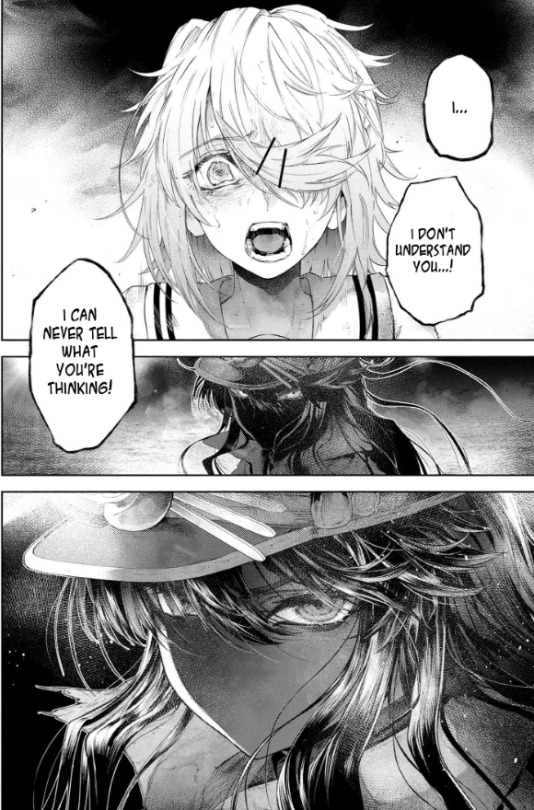
#fate#fate type redline#wish i had the koha-ace comic on hand on nobu wishing there was a single person who understood her#Something something Archers inevitably betray their Master
295 notes
·
View notes
Text

She is smiling because she knows the umbrella is actually a gun
Btw I also made one for Okita if you wanna see
#oda nobunaga#nobu#fgo nobu#kagura#gintama kagura#fgo#fate type redline#koha ace#gintama#nobu is love nobu is life
12 notes
·
View notes
Text

#fate#fate/grand order#koha-ace#nobunaga#oda nobunaga#nobu#nobbu#meme#shitpost#fgo#planet of the apes
7 notes
·
View notes
Text





Nendoroid #2632 - Oda Nobunaga by Good Smile Company
#nendoroid#oda nobunaga#good smile company#anime figure#figure collecting#fate#fate series#fate grand order#fgo#fate go#fate type redline#fate koha ace
49 notes
·
View notes
Photo
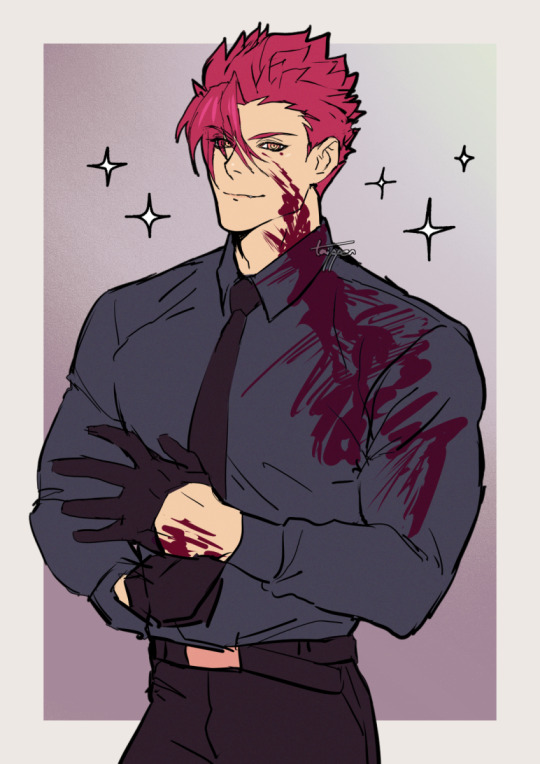
Mori from a while ago :)
#mori nagayoshi#mori#nagayoshi#森くん#森長可#fgo#fate type redline#gudaguda#koha ace#fate#fate series#blood#clip studio paint#huion#my art#taippen
250 notes
·
View notes
Text

73 notes
·
View notes
Text
Practice 101 - Still WIP Okita Souji

I'll be practicing my coloring and lighting with her. I think that's my worst weakness.
I always wanted to draw her a bit muscular because c'mon she'll have at least developed that with years of practicing and killin'
I'mma draw her with Nobu next time
#practice 101#okita souji#fate grand order#fate series#redline#koha ace#next time I'll draw her with Nobu
8 notes
·
View notes
